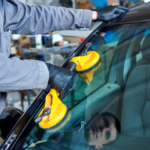You’re cruising down the highway on your way to work when you notice one of the indicator symbols on your dash lights up. Should you be concerned? Maybe.
Color Counts
When it comes to dashboard indicator lamps, the color definitely matters. Green lights (sometimes blue) mean everything is working as designed. Carry on with your day.
Yellow/Orange/Amber lamps mean something needs to be serviced soon. Get an appointment with a dealer or repair shop and have it looked at.
Red, as you might imagine, means something requires immediate attention. It could be as simple as a “door open” or “fasten seatbelt” or an issue like oil pressure loss or engine overheating. Never ignore a red lamp.
Types of Indicator Lights
We’ll start with the ones requiring immediate attention, the red indicator lights.
- Battery Charge Warning – Could indicate issues with the battery, wiring, or alternator, even if your car starts up and seems OK.
- Engine Coolant Temperature – Your engine is getting too hot. Shut it off and allow it to cool, then get it looked at as soon as you’re able.
- Oil Pressure – Your oil pressure is low. It may just need to be topped off with a quart, and if that turns off the light, you’re good. Otherwise, it could be indicative of a leak, broken oil pump, or similar. Get it serviced.
- Transmission Temperature – Your transmission is getting too hot. This can be caused by a leak or low transmission fluid, towing a heavy load, or worn transmission parts. (Note: This sometimes shows up as an Amber/Orange warning light. Either way, get it checked out right away)
- Airbag Warning – This lights up when starting your vehicle (as will many lights), but if it stays on while driving, there could be an issue with one of your airbags. Your car will still run, but there could be a problem in the event of a collision.
- Door Open – Self explanatory. Close the offending door, then be on your way.
- Seat-Belt Reminder – Also self explanatory. Buckle up for safety, or at least so the buzzer/chime will turn off.
Next up are the Amber/Orange/Yellow warning lights. These signify something that you should get checked as soon as possible but aren’t immediate issues.
- Check Engine (CEL) – The “granddaddy” of all warning indicators, it’s simultaneously the scariest and most ambiguous. The possible causes range from a loose wire, faulty sensor or poorly fitting gas cap, all the way to something much more serious. If the light is steady, get it checked as soon as you can. If the light is flashing, it indicates a serious problem that needs to be addressed immediately. The longer you drive the car, the more seriously it can be damaged. Causes of flashing CEL are issues like faulty spark plugs, faulty crankshaft and other serious issues.
- Anti-Lock Brake System (ABS) – This light means there is an issue with the car’s anti-lock braking system, such as a bad speed sensor, bad ABS tone ring (used by the ABS sensor to measure wheel speed), defective ABS module or wiring, malfunctioning hydraulic pump, or a blown fuse.
- Tire Pressure Monitoring System (TPMS) – This warning light means there is a possible issue with the sensors or a connection to the sensors. Check your tire pressure manually to see if any of the tires are too low or too high. Afterward, reset the system (check your owner’s manual) and if it remains lit, have the TPMS checked out.
- Traction Control – Sometimes known as Electronic Stability Program (ESP), this light means you’re either driving in slippery conditions and the system is activated, or there’s an issue with the system if you’re not, in which case you should get it checked out.
These warning indicators are the most common and most important to know about, but they’re certainly not all the indicator lights a vehicle might have. Your owner’s manual will have information on the most important warning lights your vehicle may have, so take some time to familiarize yourself with them to help address minor problems before they become major ones.









